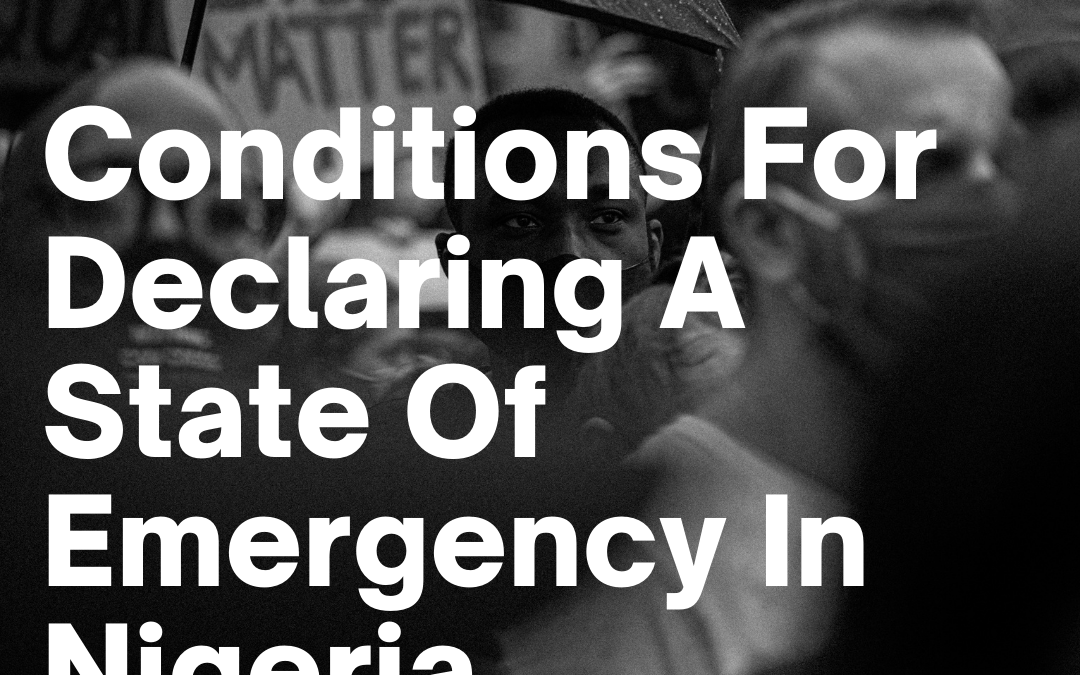A state of emergency or emergency is a situation in which a government makes policies that it would ordinarily be unable to do, in order to protect and ensure the safety of its citizens. Such a state can be declared during civil unrest, armed conflict, epidemic, pandemic and natural disaster.
Section 305 (3) of the 1999 constitution of Nigeria provides thus:
(3) The president shall have power to issue a proclamation of a state of emergency only when:
(a) the Federation is at war;
(b) the Federation is in imminent danger of invasion or involvement in a state of war;
(c) there is actual breakdown of public order and public safety in the Federation or any part thereof to such extent as to require extraordinary measures to restore peace and security;
(d) there is a clear and present danger of an actual breakdown of public order and public safety in the Federation or any part thereof requiring extraordinary measures to avert such danger;
(e) there is an occurrence or imminent danger, or the occurrence of any disaster or natural calamity, affecting the community or a section of the community in the Federation;
(f) there is any other public danger which clearly constitutes a threat to the existence of the Federation; or
(g) the President receives a request to do so in accordance with the provisions of section (4) of this section.
(4) The Governor of a state may, with the sanction of a resolution supported by two thirds majority of the House of Assembly, request the President to issue a Proclamation of a state of emergency in the state in the state when there is in existence within the state any of the situations specified in subsection (3) (c), (d) and (e) of this section and such situation does not extend beyond the boundaries of the state.
From the foregoing, it is clear that the president of Nigeria has emergency powers to declare a state of emergency over the country in times of war or disasters.
In order to prevent abuse of power, powers of emergency are subject to some constitutional checks.The legislature must approve of any declaration made by the president. Then the senate and House of representatives must deeply consider the situation and decide if they need to ratify. The judiciary plays no obvious role except when determining if the measures taken (which affect certain rights) are reasonably justified for the purpose of dealing with the situation.”
The act of proclaiming a state of emergency in Nigeria began in 1962 during the regime of Prime Minister Tafawa Balewa when it was suspected that some members of the Action Group of western Nigeria intended to overthrow the erstwhile government.
President Olusegun Obasanjo declared another state of emergency in 2004 on Plateau State. This time around the then elected governor and state house assembly were suspended because they failed to act during the incessant clashes between the Muslim and Christian communities.
The most recent state of emergency declared was by President Goodluck Jonathan in three states after some deadly attacks by the terrorist group, Boko Haram which killed over 2,000 people.
There are some benefits to declaring a state of emergency where a disaster or war or pandemic has occurred. These include providing emergency shelters or carrying out evacuations, allocating materials/equipment to help create relief, distributing/managing food and resources, imposing law and admonishing citizens to help manage the crisis. However, it is not something to be desired because most times the health service provision for the country breaks down. At some other times, human rights such as right to freedom of movement, right to freedom of expression, etc. are denied.
In the light of everything stated above, it can be concluded that section 305 (3) of the constitution is not sufficient as the only legal provision for declaration of a state of emergency in Nigeria. While it provides information on when a state of emergency can be declared, it fails to give details on how to go about it. There should be a piece of legislation in existence that does justice to this and gives a full explanation of what the president should do with his emergency powers in such a state. This would help to prevent future occurrences where the president is expected to act on his own discretion like in the historical examples cited above.
AOC Solicitors

